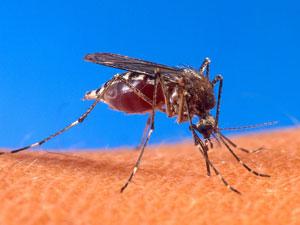Malaria-resistant mosquitoes
This story was originally reported by PRI’s Here and Now. For more, listen to the audio above.
Malaria is a preventable and curable disease that killed nearly a million people in 2008. And the problem is getting worse. “A lot of the commonly used drugs and insecticides becoming less and less effective as time goes on,” University of Arizona entomologist Michael Riehle, told PRI’s Here and Now. The solutions people have come up with so far simply aren’t working.
That’s why Riehle and others have genetically engineered a mosquito that is totally resistant to malaria. Malaria needs mosquitoes to spread to humans. So the team created a gene that effectively kills the disease inside the mosquitoes themselves.
It’s painstaking work, Riehle explained: “We’re working with mosquito eggs and injecting DNA actually into the eggs themselves.” It’s complicated, too. He said, “How it actually kills the malaria parasite, we’re not entirely sure and that’s something we’re looking into.”
The idea is to release the mosquitoes into the wild, allowing them to compete, mate with other mosquitoes and eventually take over the entire population with malaria-resistant animals.
Before that can happen, plenty of tests are needed. According to Riehle, they’re already sure that the genes kill 100 percent of the malaria inside the engineered mosquitoes. That’s important, because if any malaria were able to survive, the mosquitoes may develop a resistance to the treatment. Now, the researchers need to make sure that all the offspring of the engineered mosquitoes and regular mosquitoes are 100 percent resistant to malaria, too.
They also have to “field test them and ensure that there are no unanticipated consequences” of the genetically modified mosquitoes. That involves testing them in large greenhouses, or more controlled environments, before releasing them into the wild. Considering all that, Riehle estimates that it will be at least a decade before the treatment starts making a difference in the fight against the disease.
Even once all the testing is done, the genetically modified mosquitoes likely won’t malaria completely. According to Rihle, “It’s just another tool that we can use to help control it as insecticides and drugs are beginning to fail.”
“Here and Now” is an essential midday news magazine for those who want the latest news and expanded conversation on today’s hot-button topics: public affairs, foreign policy, science and technology, the arts and more. More “Here and Now”
Every day, reporters and producers at The World are hard at work bringing you human-centered news from across the globe. But we can’t do it without you. We need your support to ensure we can continue this work for another year.
Make a gift today, and you’ll help us unlock a matching gift of $67,000!
